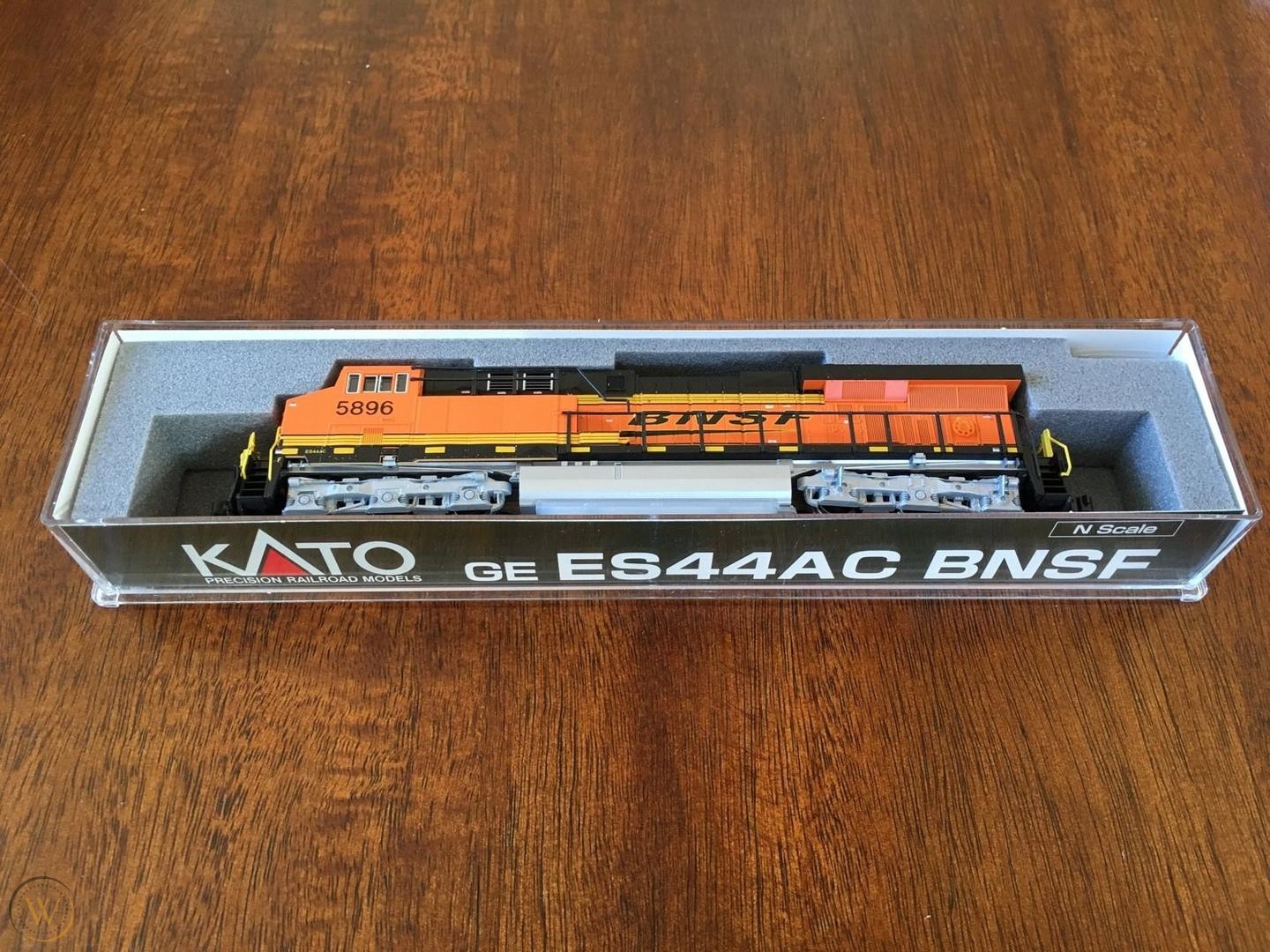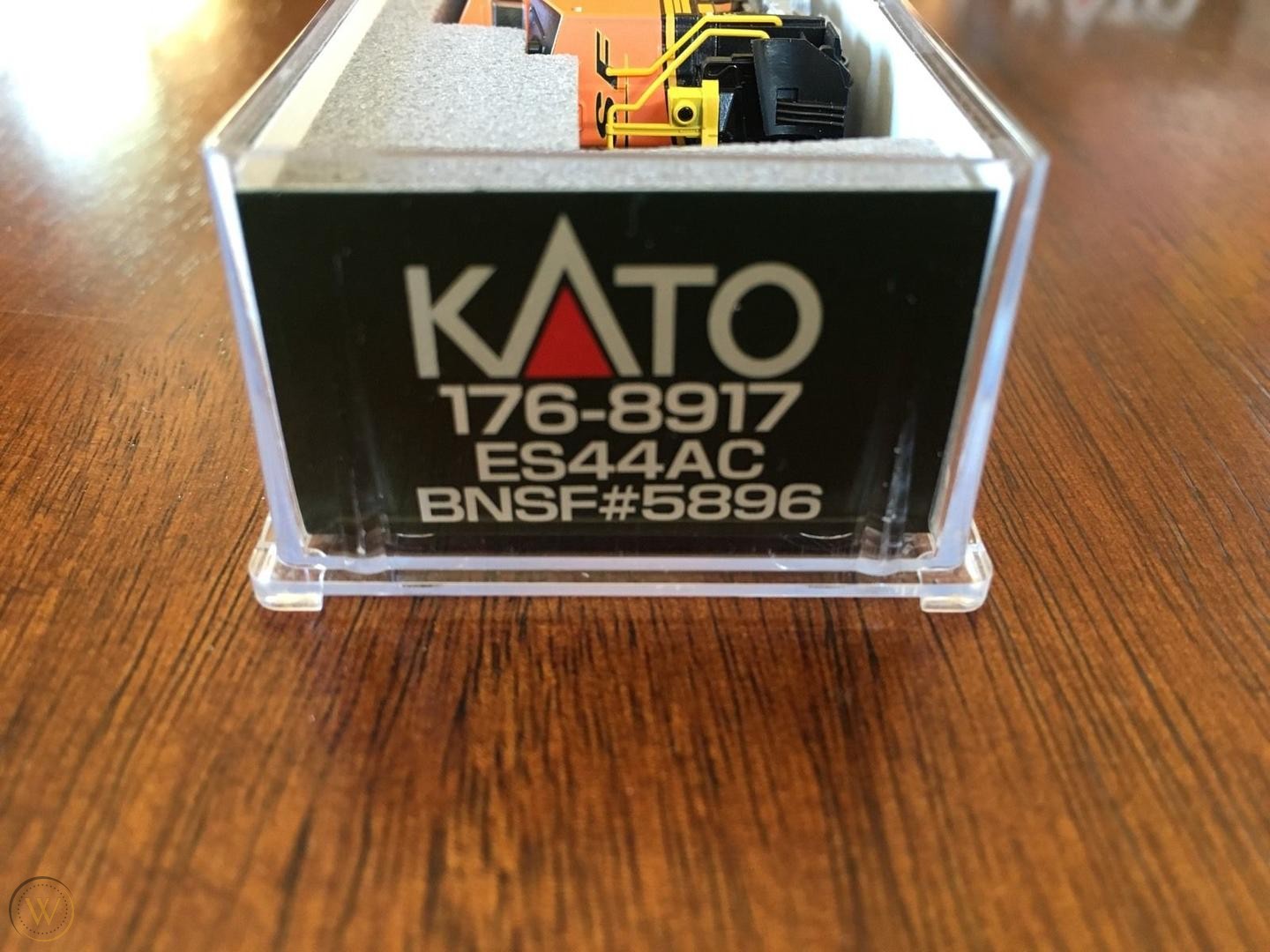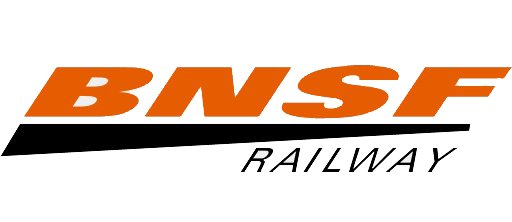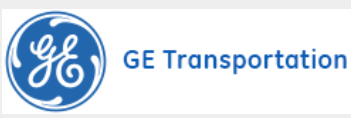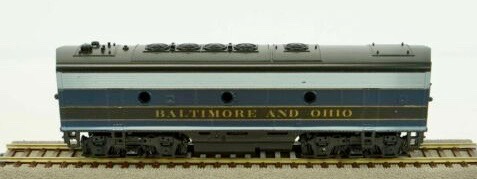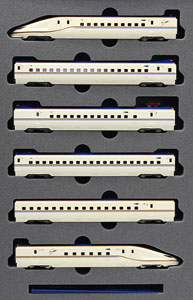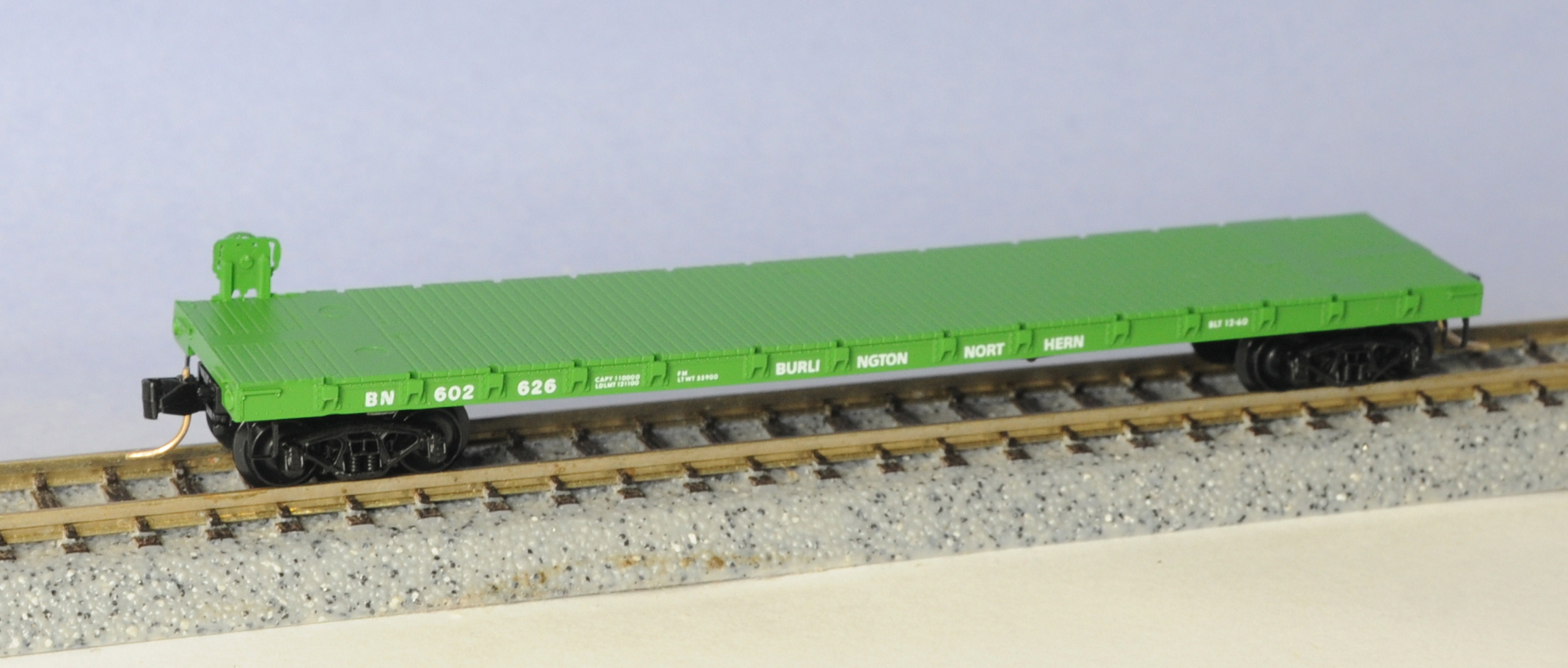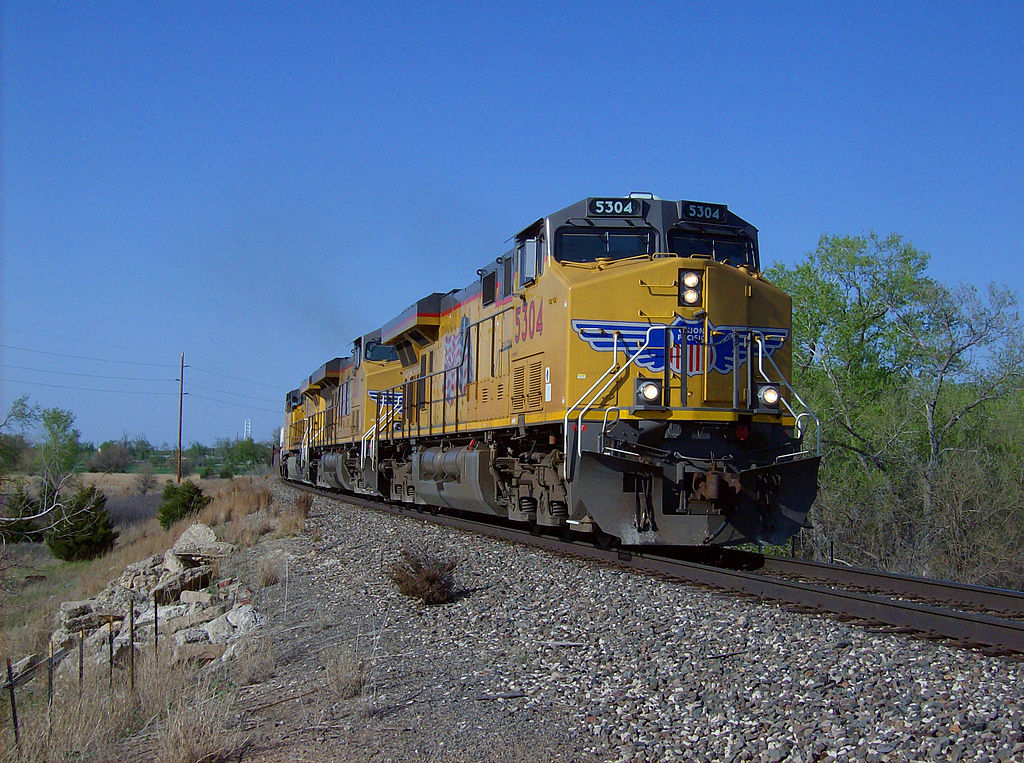Model Information: Kato introduced this model in 2010. The ES44AC has an attractive shell with plenty of detail, and the mechanism runs as well as any Kato modern chassis. Kato uses the same mechanism for the ES44AC, AC4400 and SD70 models. Hence, all of these models run well and all share the same flaw. They do not run well on curve radii smaller than 11".
The mechanism is a typical "modern" Kato diesel. It features a split-frame DCC-Ready chassis. The couplers are mounted to the shell in such a way that they can be swapped to MTL couplers with very little trouble. The motor has dual-flywheel mounted and uses a low-friction drive. The wheels are chemically-blackened. All wheels pick up power and all wheels are drivers. There are no traction tires. The motor is an open-sided 5-poler. The shell has directional lighting. The shell also features ditch-lights powered from the PC board mounted on top of the chassis. The couplers are Kato's proprietary magnetic knuckle couplers. Wheels are low-profile. The fine details parts are factory-installed. These include handrails, numberboards, MU cables and more.
The mechanism is a typical "modern" Kato diesel. It features a split-frame DCC-Ready chassis. The couplers are mounted to the shell in such a way that they can be swapped to MTL couplers with very little trouble. The motor has dual-flywheel mounted and uses a low-friction drive. The wheels are chemically-blackened. All wheels pick up power and all wheels are drivers. There are no traction tires. The motor is an open-sided 5-poler. The shell has directional lighting. The shell also features ditch-lights powered from the PC board mounted on top of the chassis. The couplers are Kato's proprietary magnetic knuckle couplers. Wheels are low-profile. The fine details parts are factory-installed. These include handrails, numberboards, MU cables and more.
DCC Information: Models accept the following plug-in decoders:
- Digitrax DN163K1C: 1 Amp N Scale Mobile Decoder for Kato N scale SD40-2 locos made from year 2006 onward.
- Digitrax SDN144K1E: 1 Amp N Scale SoundFX/Mobile/FX3 Function Decoder for Kato SD40-2 and similar locos.
- TCS K1D4: 4 Function Drop-In for Kato N-Scale EMD SD40, EMD SD70MAC, EMD SD70/75M, GE C44-9W, GE AC4400W, Athearn F45.
- MRC 1644-2: N-Scale Sound Decoder for Kato SD70MAC & AC4400
- MRC 1960: N-Scale Sound Decoder for Kato SD45/SD70MAC/AC4400
- Digitrax DN163K1C: 1 Amp N Scale Mobile Decoder for Kato N scale SD40-2 locos made from year 2006 onward.
- Digitrax SDN144K1E: 1 Amp N Scale SoundFX/Mobile/FX3 Function Decoder for Kato SD40-2 and similar locos.
- TCS K1D4: 4 Function Drop-In for Kato N-Scale EMD SD40, EMD SD70MAC, EMD SD70/75M, GE C44-9W, GE AC4400W, Athearn F45.
- MRC 1644-2: N-Scale Sound Decoder for Kato SD70MAC & AC4400
- MRC 1960: N-Scale Sound Decoder for Kato SD45/SD70MAC/AC4400
Prototype History: The Evolution Series is a line of diesel locomotives built by GE Transportation Systems, initially designed to meet the U.S. EPA's Tier 2 locomotive emissions standards that took effect in 2005. The first pre-production units were built in 2003. Evolution Series locomotives are equipped with either AC or DC traction motors, depending on the customer's preference. All are powered by the GE GEVO engine.
The Evolution Series was named as one of the "10 Locomotives That Changed Railroading" by industry publication Trains Magazine. It was the only locomotive introduced after 1972 to be included in that list. The Evolution Series, mainly the ES44DC, ES44AC, and ET44AC, are some of the best-selling and most successful freight locomotives in United States history, far surpassing the output of Electro-Motive Diesel.
ES44AC
The ES44AC (Evolution Series, 4400 HP, AC traction) replaced the AC4400CW model in the General Electric catalogue. The GE Evolution Series ES44AC locomotive represents an incredible combination of power, performance and efficiency. Originally designed to meet US EPA Tier 2 emissions, the ES44AC locomotive utilizes a 12-cylinder GE Evolution Series engine with 4-stroke combustion technology to maintain horsepower, reduce emissions, and lower fuel consumption compared to GE’s predecessor 16-cylinder FDL engine. From 2005 to 2015, the ES44AC became GE’s standard North American locomotive and a compelling platform for others worldwide.
ES44AH (C45AH)
The "H" in ES44AH stands for "heavy", which is in reference to a combination of subsystems that produce high levels of tractive effort at low speeds. UP's "AH" types are similar to CSXT's, except for their Hi-Ad trucks, and are designated C45AH's by Union Pacific.
ES44C4
The ES44C4 (Evolution Series, 4400 HP, AC traction, 4 powered axles) was introduced in 2009. While similar to the ES44AC, the ES44C4 has two traction motors per truck, instead of the conventional three such as on the ES44AC. The center axle of each truck is unpowered, giving an A1A-A1A wheel arrangement. BNSF Railway is the launch customer for this model.
ES44DC
The ES44DC (Evolution Series, 4400 HP, DC traction) replaced the Dash 9-44CW model in the General Electric catalogue. Primary users are BNSF Railway, CSX Transportation, and Canadian National Railway.
ET44AC
The ET44AC (Evolution Series Tier 4, 4400 HP, AC traction) replaces the ES44AC model. The GE Evolution Series ET44AC locomotive meets the U.S. Environmental Protection Agency’s (EPA) stringent Tier 4 emission standards without the use of any aftertreatment, enabling railroads to gain significant savings through urea infrastructure cost avoidance and reduced operational costs. Part of the Ecomagination-certified Evolution Series, the ET44AC locomotive is designed to meet Tier 4 emissions standards by reducing emissions by 70% below Tier 3 requirements. GE Transportation has invested $600M in the Evolution Series since its introduction in 2005 and is the first supplier of Tier 4 locomotives for Class 1 railroads.
ET44AH (C45AH)
Successor of the ES44AH.
ET44C4
Successor of the ES44C4.
From Wikipedia
From GE transportation website
Read more on American-Rails.com
The Evolution Series was named as one of the "10 Locomotives That Changed Railroading" by industry publication Trains Magazine. It was the only locomotive introduced after 1972 to be included in that list. The Evolution Series, mainly the ES44DC, ES44AC, and ET44AC, are some of the best-selling and most successful freight locomotives in United States history, far surpassing the output of Electro-Motive Diesel.
ES44AC
The ES44AC (Evolution Series, 4400 HP, AC traction) replaced the AC4400CW model in the General Electric catalogue. The GE Evolution Series ES44AC locomotive represents an incredible combination of power, performance and efficiency. Originally designed to meet US EPA Tier 2 emissions, the ES44AC locomotive utilizes a 12-cylinder GE Evolution Series engine with 4-stroke combustion technology to maintain horsepower, reduce emissions, and lower fuel consumption compared to GE’s predecessor 16-cylinder FDL engine. From 2005 to 2015, the ES44AC became GE’s standard North American locomotive and a compelling platform for others worldwide.
ES44AH (C45AH)
The "H" in ES44AH stands for "heavy", which is in reference to a combination of subsystems that produce high levels of tractive effort at low speeds. UP's "AH" types are similar to CSXT's, except for their Hi-Ad trucks, and are designated C45AH's by Union Pacific.
ES44C4
The ES44C4 (Evolution Series, 4400 HP, AC traction, 4 powered axles) was introduced in 2009. While similar to the ES44AC, the ES44C4 has two traction motors per truck, instead of the conventional three such as on the ES44AC. The center axle of each truck is unpowered, giving an A1A-A1A wheel arrangement. BNSF Railway is the launch customer for this model.
ES44DC
The ES44DC (Evolution Series, 4400 HP, DC traction) replaced the Dash 9-44CW model in the General Electric catalogue. Primary users are BNSF Railway, CSX Transportation, and Canadian National Railway.
ET44AC
The ET44AC (Evolution Series Tier 4, 4400 HP, AC traction) replaces the ES44AC model. The GE Evolution Series ET44AC locomotive meets the U.S. Environmental Protection Agency’s (EPA) stringent Tier 4 emission standards without the use of any aftertreatment, enabling railroads to gain significant savings through urea infrastructure cost avoidance and reduced operational costs. Part of the Ecomagination-certified Evolution Series, the ET44AC locomotive is designed to meet Tier 4 emissions standards by reducing emissions by 70% below Tier 3 requirements. GE Transportation has invested $600M in the Evolution Series since its introduction in 2005 and is the first supplier of Tier 4 locomotives for Class 1 railroads.
ET44AH (C45AH)
Successor of the ES44AH.
ET44C4
Successor of the ES44C4.
From Wikipedia
From GE transportation website
Read more on American-Rails.com
Road Name History: The BNSF Railway (reporting mark BNSF) is one of the largest freight railroad networks in North America, second to the Union Pacific Railroad (UP) (its primary competitor for Western U.S. freight), and is one of seven North American Class I railroads. It has 48,000 employees, 32,500 miles (52,300 km) of track in 28 states, and over 8,000 locomotives. It has three transcontinental routes that provide high-speed links between the western and eastern United States. BNSF trains traveled over 169 million miles in 2010, more than any other North American railroad.[2] The BNSF and UP have a duopoly on all transcontinental freight rail lines in the Western U.S. and share trackage rights over thousands of miles of track.
According to corporate press releases, the BNSF Railway is among the top transporters of intermodal freight in North America. It also hauls bulk cargo. For instance, the railroad hauls enough coal to generate roughly ten percent of the electricity produced in the United States.
Headquartered in Fort Worth, Texas, the railroad is a wholly owned subsidiary of Berkshire Hathaway Inc.
The creation of BNSF started with the formation of a holding company, the Burlington Northern Santa Fe Corporation on September 22, 1995. This new holding company then purchased the Atchison, Topeka and Santa Fe Railway (often called the "Santa Fe") and Burlington Northern Railroad, and formally merged the railways into the Burlington Northern and Santa Fe Railway on December 31, 1996. On January 24, 2005, the railroad's name was officially changed to "BNSF Railway," using the initials of its original name.
In 1999, Burlington Northern Santa Fe and the Canadian National Railway announced their intention to merge and form a new corporation entitled North American Railways to be headquartered in Montreal, Canada. The United States' Surface Transportation Board (STB) placed a 15-month moratorium on all rail mergers, which ended this merger.
On November 3, 2009, Warren Buffett's Berkshire Hathaway announced it would acquire the remaining 77.4 percent of BNSF it did not already own for $100 per share in cash and stock - a deal valued at $44 billion. The company is investing an estimated $34 billion in BNSF and acquiring $10 billion in debt. On February 12, 2010, shareholders of Burlington Northern Santa Fe Corporation voted in favor of the acquisition.
According to corporate press releases, the BNSF Railway is among the top transporters of intermodal freight in North America. It also hauls bulk cargo. For instance, the railroad hauls enough coal to generate roughly ten percent of the electricity produced in the United States.
Headquartered in Fort Worth, Texas, the railroad is a wholly owned subsidiary of Berkshire Hathaway Inc.
The creation of BNSF started with the formation of a holding company, the Burlington Northern Santa Fe Corporation on September 22, 1995. This new holding company then purchased the Atchison, Topeka and Santa Fe Railway (often called the "Santa Fe") and Burlington Northern Railroad, and formally merged the railways into the Burlington Northern and Santa Fe Railway on December 31, 1996. On January 24, 2005, the railroad's name was officially changed to "BNSF Railway," using the initials of its original name.
In 1999, Burlington Northern Santa Fe and the Canadian National Railway announced their intention to merge and form a new corporation entitled North American Railways to be headquartered in Montreal, Canada. The United States' Surface Transportation Board (STB) placed a 15-month moratorium on all rail mergers, which ended this merger.
On November 3, 2009, Warren Buffett's Berkshire Hathaway announced it would acquire the remaining 77.4 percent of BNSF it did not already own for $100 per share in cash and stock - a deal valued at $44 billion. The company is investing an estimated $34 billion in BNSF and acquiring $10 billion in debt. On February 12, 2010, shareholders of Burlington Northern Santa Fe Corporation voted in favor of the acquisition.
Brand/Importer Information: KATO U.S.A. was established in 1986, with the first U.S. locomotive model (the GP38-2, in N-Scale) released in 1987. Since that time, KATO has come to be known as one of the leading manufacturers of precision railroad products for the modeling community. KATO's parent company, Sekisui Kinzoku Co., Ltd., is headquartered in Tokyo, Japan.
In addition to producing ready-to-run HO and N scale models that are universally hailed for their high level of detail, craftsmanship and operation, KATO also manufactures UNITRACK. UNITRACK is the finest rail & roadbed modular track system available to modelers today. With the track and roadbed integrated into a single piece, UNITRACK features a nickel-silver rail and a realistic-looking roadbed. Patented UNIJOINERS allow sections to be snapped together quickly and securely, time after time if necessary.
The Kato U.S.A. office and warehouse facility is located in Schaumburg, Illinois, approximately 30 miles northwest of Chicago. All research & development of new North American products is performed here, in addition to the sales and distribution of merchandise to a vast network of wholesale representatives and retail dealers. Models requiring service sent in by hobbyists are usually attended to at this location as well. The manufacturing of all KATO products is performed in Japan.
Supporters of KATO should note that there is currently no showroom or operating exhibit of models at the Schaumburg facility. Furthermore, model parts are the only merchandise sold directly to consumers. (Please view the Parts Catalog of this website for more specific information.)
In addition to producing ready-to-run HO and N scale models that are universally hailed for their high level of detail, craftsmanship and operation, KATO also manufactures UNITRACK. UNITRACK is the finest rail & roadbed modular track system available to modelers today. With the track and roadbed integrated into a single piece, UNITRACK features a nickel-silver rail and a realistic-looking roadbed. Patented UNIJOINERS allow sections to be snapped together quickly and securely, time after time if necessary.
The Kato U.S.A. office and warehouse facility is located in Schaumburg, Illinois, approximately 30 miles northwest of Chicago. All research & development of new North American products is performed here, in addition to the sales and distribution of merchandise to a vast network of wholesale representatives and retail dealers. Models requiring service sent in by hobbyists are usually attended to at this location as well. The manufacturing of all KATO products is performed in Japan.
Supporters of KATO should note that there is currently no showroom or operating exhibit of models at the Schaumburg facility. Furthermore, model parts are the only merchandise sold directly to consumers. (Please view the Parts Catalog of this website for more specific information.)
Item created by: Powderman on 2021-12-26 17:10:45. Last edited by Powderman on 2021-12-26 17:10:46
If you see errors or missing data in this entry, please feel free to log in and edit it. Anyone with a Gmail account can log in instantly.
If you see errors or missing data in this entry, please feel free to log in and edit it. Anyone with a Gmail account can log in instantly.


